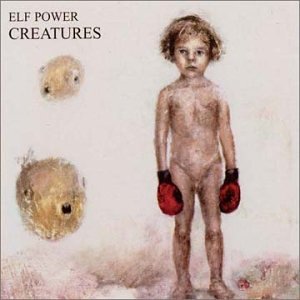FOREWORD: Starting out as a fascinatingly melancholic lo-fi do-it-yourself combo, Elf Power soon became one of the most peculiar Elephant 6 ‘collectives,’ capriciously stuffing complex prog-rock eccentricities into orchestral melodies and grizzled psychedelia. I interviewed Elf Power’s Andrew Rieger to help promote ‘02s nearly brilliant Creatures. By ’04, they’d release countrified pop turnabout, Walking With The Beggar Boys, receiving little fanfare despite its wide-eyed accessibility. In ’08, Elf Power hooked up with wheelchair-bound cracked-folk enigma, Vic Chesnutt, for reputable despair-fueled collaboration, Dark Developments.
Elf Power singer-guitarist Andrew Rieger gained respect for rock music from his father, a Shakespearean professor with a good ear for modern sounds. Perhaps that explains why Rieger’s songwriting relies on acute literate metaphors and succinct verbiage.
During the ‘90s, this Athens, Georgia-based artist followed the viable trend towards recording sketchy, homemade, do-it-yourself cassettes for tiny boutique labels. Soon after, Rieger’s earliest full-length Elf Power CD release, ’95s Vainly Clutching At Phantom Limbs, was made privately on 4-track tape, leading to the equally trashy gem, When The King Comes, a semi-conceptual piece made by a “real band” and captured on an 8-track machine.
Word began to spread and a devoted cult following ensued. A solid bond with like-minded independent spirits, casually known as the Elephant 6 collective (Neutral Milk Hotel, Apples In Stereo, Olivia Tremor Control), afforded Reiger and long-time partner Laura Carter (keyboard-guitar) the chance to fully hone in on their post-adolescent psych-pop.
While ‘99s A Dream In Sound effectively condensed song arrangements and sonic ideas substantially, ‘00s The Winter Is Coming found Elf Power at the top of their game, caressing affectionate confessionals with the prettiest melodies yet. But when financial woes hurt former label, Sugar Free, the combo jumped ship, delaying the release of Creatures (SpinArt), their most efficient set of songs to date.
The evocative neo-orchestral landscape of Creatures embraces non-traditional rock instrumentation (Finch’s serene violin; Carter’s lissome accordion; and guest Heather Mc Intosh’s gliding cello) to enhance the melancholic surroundings. Shifting from the fuzzy electro-groove cacophony “Everlasting Scream” to the Celt-rock-tinged “The Modern Mind” to the full-blown rocker “Things That Should Not Be,” this easygoing bunch (currently rounded out by percussionist Aaron Wegelin and guitarist Adrian Finch) tame passive-aggressiveness with winsome transience in a well-balanced recreational manner. Ultimately, they prove lessons learned from previous ventures benefit those who bravely persevere.
AW: Who are some early influences?
ANDREW: My dad was a big record collector who got me into the Beatles, Stones, and Richard Thompson and the Fairport Convention. Being around him got me into music originally.
Does the title Creatures work as some secret metaphor for your muse?
It’s one of those things where I didn’t consciously notice how prevalently mentioned it was.
So let’s get this straight. (busting his balls) Andrew claims these “creatures” weren’t consciously part of the plan even though there’s two fucking songs with that title, a drifting seafaring tale about the sea, and some tryst with a sleeping serpent. Sounds like a scheme.
(laughing) I didn’t know it was there! There’s definitely supernatural imagery in the lyrics that always pop up in my songs. Maybe it’s from reading Marvel comics like Conan and Spiderman while growing up… I sold them when I needed cash to record.
“Let the Serpent Sleep” has a smooth Velvet Underground elegance.
Definitely. The cheesy organ and strolling patterns. I’ll admit to that.
Did you try to create a beautiful sequential lyrical theme? The last few songs seem consistent in moodiness and approach.
The last couple songs get mellower. That was a conscious way to wind it down.
Your arrangements have become more seamless as the textural splendor gets filtered into the lyrics better.
Our trick for that was using the combination of accordion, violin, and e-bow. We’d record the same parts on each instrument and after awhile you couldn’t tell which instrument was playing. It made a weird hazy sound and nice little fuzzy blanket for the songs. This time the songs influenced the extra instrumentation outside the guitar-bass-drums-keyboard standard. We tried to limit it to accordion and violin to give the songs uniformity and consistency.
I thought this albums’ warm lucidity harkened back to The Winter Is Coming, but it’s less brooding.
When we recorded The Winter Is Coming, we took our time and much of it was done over nine months. This time, we wanted to strip it down and make the songs more direct and simpler. We recorded them as we rehearsed arrangements instead of experimenting with a million overdubs like we usually do.
Smack dab in the middle is the catchy full-blown rocker “Things That Should Not Be.”
It’s punky aggressive. When we play live, we do Stooges, David Bowie, and Bad Brains covers. That rubbed off on the songwriting. We don’t try to represent our refined studio sound. We try to rock out and have fun.
Previous albums were back-loaded with noodling jams, unfinished ideas, and ephemera.
Yeah. I agree with that. That’s the problem when you have all the time in the world to experiment. Sometimes it works great and you get good parts. Other times, it’s self-indulgent. When you hear something new, it could sound good. Six months later, you’re wondering what you were thinking.
What has happened with the Elephant 6 collective of artists-musicians that shared ideas, band members, and studios and became all the rage a few years back?
It was a group of friends with similar aesthetic. Many of them played on our new record. But it’s not a record label, as some think. Apples In Stereo were in Denver, but are moving to Kentucky. Neutral Milk Hotel have splintered. One of them is in France.